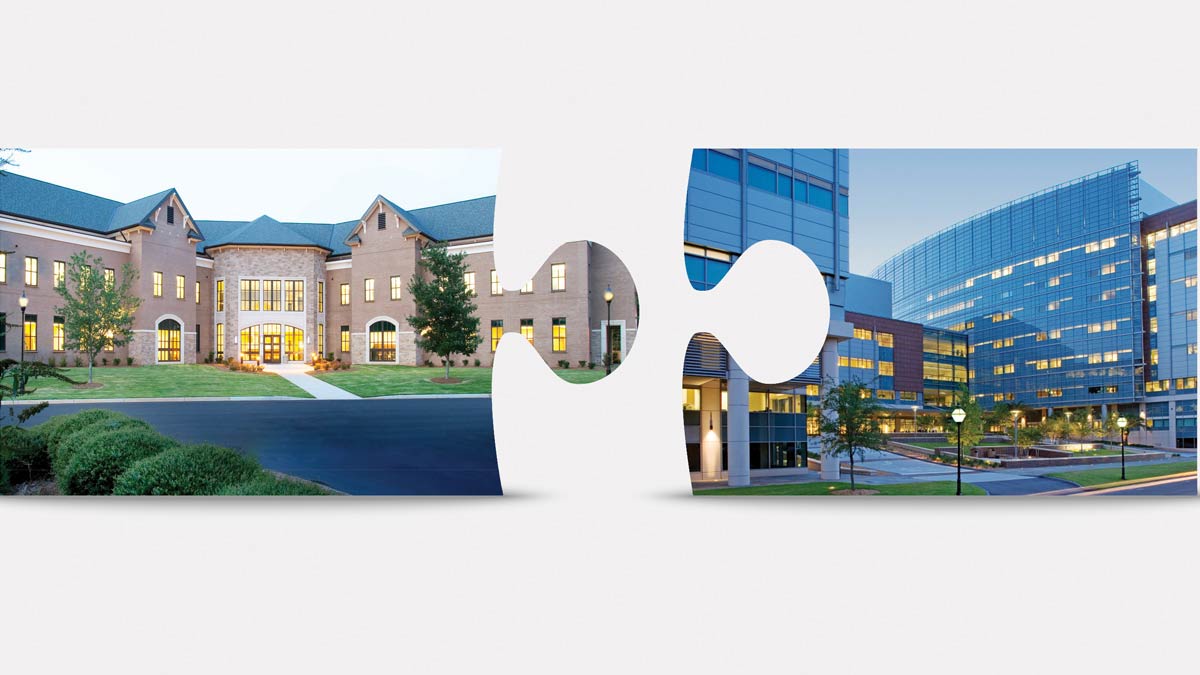Since 1974, the not-for-profit Greenwood Genetic Center has quietly gone about its business of providing help and hope to countless families and individuals near and far. However, unless you have found yourself in desperate need of their unique services, you probably have never heard of the place. Get ready to be impressed.
When Johns Hopkins genetics fellows Roger Stevenson and Harold Taylor first envisioned their own clinic, they agreed on a two-fold approach: advancing the field of medical genetics through state-of-the-art technology and providing accessible, compassionate support for families blindsided by genetic disease and birth defects. Today, their dream occupies a four-building campus in Greenwood, with satellite offices in Florence, Charleston, Greenville and Columbia. It is the nation’s first independent organization to offer comprehensive genetic services. More importantly, all South Carolina residents are served, regardless of their ability to pay, a situation made possible by funding through the South Carolina Department of Disabilities and Special Needs, as well as public and private donations.
Additionally, Greenwood Genetic Center holds a worldwide reputation for quality work in diagnostic laboratory testing. Most kinds of genetic testing can be completed with a simple blood sample. The Center not only provides answers for families impacted by genetic diseases worldwide but also attracts top scientists to its faculty from around the globe. In the international medical world, GGC is highly respected for its ongoing focus on research and innovation in scientific development as well as its work with intellectual disabilities and the identification of new syndromes.
For example, GGC’s Birth Defects Prevention Program educates women on the importance of including folic acid in their diets before and during pregnancy. The program is credited with reducing the risk of severe birth defects of the brain and spine by 60%, resulting in 70 more healthy babies being born in South Carolina each year.
According to Lori Bassett of GGC’s office of communications, “Because Greenwood Genetic Center operates independently, it has the freedom and flexibility to pursue projects that can further its goals.”
For example, 6,000 zebrafish recently arrived at the campus aquaculture facility. These fish share 70% of the same genes as humans and will aid in understanding rare diseases and help identify treatment options.
In 2010, a Genetic Education Center was added to the Greenwood campus, and with it came the “Gene Machine,” a 40-foot custom bus with a mobile science lab that visits 13,000 South Carolina middle and high school students annually. Simulated scientific experiments can be performed onboard. The goal is to educate and attract students to the possibility of careers in genetics. A second vehicle, the “Helix Express,” has also been drafted into service for educational purposes. Furthermore, GGC welcomes field trips and visitors of all ages. Teachers can take summer science courses there, and the community is invited to participate in an informational program, “Science on Tap.”
Of all the Center’s many services, it is the very intentional relationship of clinical patient care with South Carolina residents that is most heart-stirring. The emphasis of Drs. Stevenson and Taylor on compassionate support is more than a sweet philosophy. It is always the first response to those in need of answers and support for unexpected medical challenges.
Consider the Shenal family of Greenwood. At eight months pregnant, Jodi learned of her doctor’s concern about her baby’s slow growth rate. Genetic testing was performed by GGC to find the cause of the issue, but, more than that, when baby Ryleigh made her appearance shortly thereafter, GGC Director Dr. Steve Skinner was present at the hospital to greet her and offer support to her family for the difficult journey ahead. Ryleigh was born with a rare chromosome deletion, but, because of the early diagnosis, crucial intervention services could be implemented immediately.
Today, despite significant challenges, this special little 8-year-old is, according to her mother, “the joy of our household.” Ryleigh continues to receive yearly checkups and support from the GGC staff, whom the Shenals consider more like family than just medical providers.
“We have been overwhelmed with gratitude, and that’s why we, like so many other appreciative families, devote time to ‘Race the Helix’ and other fundraisers that create awareness for this amazing, compassionate organization,” said Shenal.
But GGC’s story does not end here. After enjoying a decade of friendly collaboration with the Medical University of South Carolina in Charleston, the two organizations recently formalized what has already been a symbiotic relationship, and South Carolina residents are about to be the beneficiaries of the best practices and skills of their combined efforts. According to MUSC’s December 2019 press release, “The goal of this new partnership is to provide South Carolina patients with accessible, high-quality genetic services that are both coordinated and cost-effective.”
To accomplish this goal, GGC brings experience and strengths in clinical genetic care and diagnostic testing, while MUSC offers expertise in clinical trials and health care education. Each year, more than 3,000 students and 700 residents study and train at one of MUSC’s six colleges.
David J. Cole, M.D., FACS and MUSC president suggested this new formal collaboration is a win-win situation for both organizations: “We’re affiliating with the best genetic experts in South Carolina, and they are partnering with the best academic medical faculty and specialty-care providers in the state to move health care forward for all.”
Heather Woolwine, who directs the office of public affairs and media relations for MUSC, is equally enthusiastic about this new partnership: “We are pairing the best of MUSC’s clinical and research expertise with GGC’s reputation and skills in genetics, allowing us to uncover additional areas to collaborate and to impact care. Our associations will be more strategic and intentional to address state-wide challenges, one of which is the problem of workforce shortages in the field of genetics. Furthermore, this new affiliation opens an opportunity to more seamlessly treat patients and coordinate care across both organizations, when needed.”
Woolwine’s GGC counterpart, Lori Bassett, echoes those sentiments: “This agreement between our organizations offers broader and more valuable connections with MUSC as a whole, providing opportunities that have not been previously explored. The ultimate goal is to improve patient care for those across South Carolina who are impacted by a genetic disorder.”
Although still in the planning stages, valuable collaborative options could include co-recruiting, shared personnel and joint education. MUSC may offer GGC access to space at MUSC facilities to see patients as needed. Also, both GGC and MUSC will explore shared strategic research, technological advancements and clinical trial opportunities.
While enjoying the many benefits that go along with this new formal relationship, each organization will preserve its own independent identity, mission, vision, brand and operation. GGC and MUSC will remain two distinct and separate institutions united around a common goal of improving the quality of life for thousands of South Carolina residents and their families who have been impacted by a genetic diagnosis – families just like the Shenals.
Janet E. Perrigo







